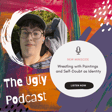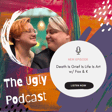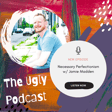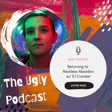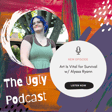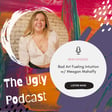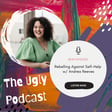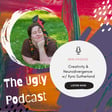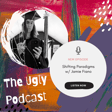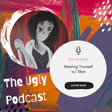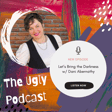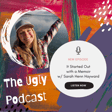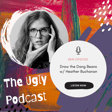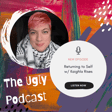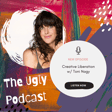Introduction to The Ugly Podcast
00:00:04
Speaker
Welcome to The Ugly Podcast, the place where creatives are encouraged to make messy, ugly art and to redefine their relationship to their inner critic. Every other week, I am joined by creatives of all mediums and methods to discuss our creative processes and how we navigate the mental minefield of creativity. This podcast serves as a reminder that you and your art get to be whatever the hell you want to be, ugly and all.
Balancing Authenticity and Privacy
00:00:31
Speaker
Welcome back to the Ugly Podcast. It has been a while. I have missed doing this and I have been stressing about getting out this first episode to people because I went on a hiatus and I like to be authentic in like
00:00:54
Speaker
telling about my life and talking about the messy side of things. But I also don't want to share my life story with people. So it's been stressful. But thankfully, I was with my dearest friend, Emerson, last weekend and talking about, they started talking about time and how time feels weird.
00:01:22
Speaker
and how it stretches and condenses, and it's so strange. And I was like, that's it. That's what I want to talk about. So I have Emerson here with me. Hi, Emerson. Hi. I'm so happy to be here and to talk about time being weird. Yay. It has been so weird for both of us this whole year. So, so weird. Yeah, 2023 was a year of mess, absolute mess.
Personal Evolution Through Grief
00:01:51
Speaker
Um, so briefly for listeners, I, uh, went on a hiatus because I got a divorce last year and I'm not going to get into the degree details of all of that, but I do want to talk about like how that time felt because all of us go through seasons of grief and hard times and
00:02:14
Speaker
continuing to do what you did before doesn't work in those times. You cannot just continue doing business as usual. And I mean, some people do, some people use that as kind of a coping mechanism, but then they don't actually end up dealing with the grief that they're experiencing. So, you know, that wasn't going to work for me. So yeah, it's been
00:02:36
Speaker
a very messy time and a time I've gotten to know myself very well and a time where I couldn't do all the things and I had to just put things down.
Embracing Life's Messiness
00:02:46
Speaker
And hence why this podcast won't hate us. And yeah, so.
00:02:54
Speaker
I had more I wanted to say about this, and I wrote it down because I knew I'd forget and lo and behold, I forgot. Yeah, so I wanted to especially talk about this because I think the way that we've both handled this past year
00:03:09
Speaker
has been very aligned with the ugly way of doing things and embracing the mess, embracing crying at odd hours of the day, taking days to cry, and really abandoning the status quo or abandoning the regular business day because
00:03:32
Speaker
You can't. You have to tend to your sad little human heart and take care of yourself. And we all need to do that. And so, yes, that's that's where we're at. That is.
Complex Emotions of Life and Loss
00:03:50
Speaker
So, Emerson, your biggest, your big, most recent grief was even more recent than mine. How is time feeling for you right now?
00:04:02
Speaker
Yeah, like you said, 2023 has been a messy, weird time year. Yeah, so it goes hand in hand. I've got life and death in both hands. In June, I found out I was pregnant, which was not expected and not planned. It was a welcome surprise, but very much a surprise. And then very, very quickly, within one week, we knew that we were going to have to put my dog down.
00:04:32
Speaker
Um, within before the baby came. And so as I've been pregnant and as I've been frosted with pregnancy, we did, um, I carried my dog through his, um, his last months and his last weeks and hours and minutes, um, and beyond and after. Um, and that has been really intense.
00:04:52
Speaker
holding the life and holding the future in one hand and holding the past and death in the other hand and all of the emotions associated with both of those things and how they ebb and flow. And it's not that the life is good and the death is bad, you know?
00:05:08
Speaker
being there with him through his death and beyond has been really beautiful. Being there for my baby as they come into the world has been really hard. There's beauty and difficulty on both sides of it. It's really frustrating to me when people are like, oh, that sucks that your dog died, but that's great you're having a baby. It's very overly simplistic. It's very black and white. Yeah.
00:05:31
Speaker
In some ways, my dog's death felt more comfortable, I was more prepared for it, and the birth is a lot more discombobulating. I've been all over the place on both of them, cried a lot about my dog, have had those days where I just cry seven times a day, and in between I might eat a little bit and take a shower or take a walk. I know how that's been.
00:05:59
Speaker
Yeah, it's just a different flow of time when you're attending to your feelings and your grief and the needs of the moment naturally as they come up because our world doesn't do that.
Challenging Societal Expectations
00:06:12
Speaker
Our world is very like you're clocking in at nine. You're going home at five or maybe six or seven. You're going to scarf down some food then you're going to watch TV. And you know, you got to make time for your errands and your appointments. Like it's very structured, very
00:06:26
Speaker
rational linear time. And I am completely outside of that right now. And I think you have been too. Yeah, absolutely. Well, as you're talking, I was thinking of like bereavement time that people get off for like traditional jobs. Like you get what is it four days for bereavement or something. It's something wild, like such a short amount of time. And it's like four days to like, feel no, no, that's not that's not how that works. Yep.
00:06:54
Speaker
Yeah, I love what you're saying also about the two opposing sides, because I think for me, my quote unquote good and my quote unquote bad are the divorce is quote unquote bad. And then on the good side, I have discovering my gender identity and coming into myself more fully. And that's been so beautiful and wonderful. And then also on this other side, I have the divorce, which is,
00:07:23
Speaker
has also had its beautiful moments where like, again, not going to go into details about it, but like just, um, yeah, there's always, they're, they're not just all good and all bad. They're these full, full moments that are just very rich in feeling and in, um, I lost my train of thought, but yeah.
00:07:52
Speaker
Yeah, I love what you're saying with that.
Richness of Human Experiences
00:07:55
Speaker
And that goes, too, with my work. If people don't know, I work with people living with dementia. I work especially with people who are afraid of getting dementia. And that's a lot of what we talk about there, is dementia is not an inherently, entirely, completely miserable experience. You're still human. You still smile. You still connect with people. You still find meaning. And that's true of literally everything, literally every single experience we could possibly have, whether it's job loss, whether it's a sudden loss of,
00:08:22
Speaker
you know, a parent, whether it's, you know, anything, divorce, pet loss, all of this. Humans are capable of relating to them in so many different ways. And I think the word you use there was so fit that it's rich. It's very rich experience. It's very multidimensional and you have all sorts of feelings and they all coexist and they're not good or bad. They just are. When I've been sobbing,
00:08:54
Speaker
I've also felt very content in that. I'm like, hey, what we're doing right now is we are sobbing and I'm doing it so well. I am kicking this cry session's ass. Yes. I am getting an A plus. Yes.
Art as a Tool for Processing Grief
00:09:15
Speaker
An extra credit too.
00:09:18
Speaker
Yeah, I remember when because I've, I've continued to use art as a way to understand my grief and just process it in any given moment. And one thing for for some reason, like during kind of the height of the divorce and everything, whenever I would think about my grief, it was always green. And so like, I was talking to my therapist about this and like,
00:09:42
Speaker
they were telling me like well grief is usually associated with like life and like new things like growing and stuff and like that's so interesting because like for me like it yes that and like grief is so like heavy it's also like decomposing and yeah it's it's a very rich color it's a very like multifaceted like color that popped into my head and it popped into my head every single time so i wrote a little poem called grief is green
00:10:12
Speaker
Oh, I love that. It's so beautiful. I've been gravitating a lot towards poetry, especially with my dog. I've written about the baby too and life in general, but I think there's something about loss that brings up an intensity of needing to process poetically. I read a quote, I can't remember who it was from and it was so beautiful, but it was something about
00:10:36
Speaker
When something exists, you don't need words to describe it. But when it's gone, the loss, the absence, you're like searching for those words to be like, where are you? How do I like bring you into? Yeah. Yeah. I mean, I have. That is so true. It is. I have written so much around breakups and losses. And yeah, it helps so much. And I've written a lot about my dog and loved what I've written. It feels like he's kind of been there in that process.
00:11:07
Speaker
And yeah, I'm losing my train of thought now. Something about creativity. I love the Ugly podcast. I know. Using poems to process those feelings and to give structure to them I think has been
00:11:27
Speaker
really valuable for me. And yeah, like when we have those feelings of grief or depression or things that just seem out of our control that live in our bodies, but that don't like, it seems like a different reality from what's going on around you. And so then making the art can like turn it into more of a reality and like help you process it more. Yeah. Yeah.
00:11:53
Speaker
Yeah, and I liked what you were saying about like your grief being green and
00:11:59
Speaker
just some of the ways you talk about kind of the intuitiveness of your art. I think that's such a powerful way to step outside of time and step outside of rationality and like harness the experience and work with it. I've had similar things come up of just visualizations and imagery and certain colors seeming really strongly associated with my dog and things like that. And I love that. It's playful. It's fun.
00:12:28
Speaker
I've gotten really in my head of like, is that really like his spirit or like, is this really needing that tangibility and rationality? And I've started to just embrace like, I'm just going to go with whatever I feel inclined towards and really writing that. The timelessness and the intuition go really hand in hand.
00:12:50
Speaker
Oh yeah, totally. We have this idea that everything we do has to be good or have value. This belief leads us to burn out. It can hold us back from creating altogether. But in my Ugly Art 101 course, I break down these restrictive beliefs and lead you through exercises that intentionally subvert perfectionism and bring playfulness back into your creative process.
00:13:12
Speaker
You can get the first day absolutely free by going to my website, scribeandsunshine.com and signing up on the homepage. Join me in my weird, ugly art revolution. Back to the show. So speaking of timelessness, um, you told me that you were reading this book called 4,000 weeks.
00:13:36
Speaker
And as you're telling me about this, this is what like kicked my brain into like, this is what you want to talk about. This is how you need to come back with the podcast. So tell us about this book. I love this book. I'm just demonstrating it. It changed my life. So it's called 4,000 weeks time management for mortals by Oliver Berkman.
00:13:56
Speaker
I will say that again so people can write it down. 4,000 weeks. Oh, I'll have it. I will have it in the show notes. It'll be there. Good. Yes. Yes. So 4,000 weeks. Oh my gosh. I loved it. So the concept, I'll start with the concept. This author said the average lifespan is around 4,000 weeks. Of course, it could be far less or more.
00:14:16
Speaker
But we get about 4,000 weeks. And most people, when they hear that, they go, that's not very much time. And you get this sense of urgency. I need to do more with my time. How do I get more productive? How do I do more of what I want to do? And his premise is, how amazing that we get 4,000 weeks at all. And how fun could it be to say, what am I going to do with this week, or this day, or this hour?
00:14:40
Speaker
loosening ourselves from those restrictions of feeling like we have to do everything on our to-do list. And so the concept, the time management for mortals concept is we are mortal. Our time is limited. We're not going to be able to do everything, especially in our society. We are not going to be able to respond to every demand and do everything as perfectly as we're being told we should. Um, we can't kill it at work and at home and doing exercise and staying on top of all of our errands. You just can't do.
00:15:09
Speaker
everything. And so the whole premise is what do you want to do? What, what is important to you? Pick a couple of things and then do those well, um, and love them and enjoy the process. And that is just absolutely changing my whole world because I had been very, very constricted to my to-do list and very stressed out by it. Still am too. And I'm still processing it, but the, the 4,000 weeks has been a very powerful for me.
00:15:35
Speaker
I had to look this up. I have been alive for 1,663 weeks as of my birthday. Oh my god. And I was born within the same week as you. Yeah, so it'll be about the same. My first thought was, I want to look up how long I have been. And then I was like, wait. We're the same age, a week apart. Yeah.
00:16:02
Speaker
And yeah, I just, the, I think the, cause the scarcity mindset wants to come in of just like 4,000 weeks. That's not a lot, but this alternate mindset of like expansiveness and choice of like, yeah. I mean, 4,000 weeks, sure. Maybe it's not a lot, but that's also a way you can.
00:16:27
Speaker
you can embrace your day-to-day and embrace what you have and prioritize what actually matters. And what actually matters is that you are a human being who will die and you should enjoy this life however you want. And that just like makes it so expansive and freeing to think of it that way. I want that as a sound clip. You are a human being who will die and you should enjoy it. Yes.
00:16:58
Speaker
Yeah, I think that's come up for me a lot. I enjoyed the shit out of every single moment with my dog, especially in his last year and a half because he has torn his CCLs and so he was partially disabled.
00:17:15
Speaker
do a lot of accommodating and supporting for him to have a meaningful life. And I just loved every single walk we had and every single moment, every single snuggle. And then as I prepare to have a baby, I want to have that mindset too of like, especially because we're only planning on having one every single thing, like.
00:17:32
Speaker
the day that they're born, that's the one day that they're born. And those first few weeks, those are the only first few weeks, and the first of their 4,000 weeks, hopefully. And I just want to enjoy it all so much. And I don't want my to-do list and my perfectionistic standards about how intensely structured my business should be, or how clean my home should be. I don't want that getting in the way of that. Yeah.
Grief and Personal Growth
00:18:04
Speaker
It helps you figure out what you want to enjoy the most. And also just like, nope, I lost my thought again. It's the first episode back. What did you expect from me? I think it's very fitting. I think it's supposed to be this way. This is the mindset we're in these days. Yeah. And it's fine. We're just following different trails, and then they stop, and we turn around and go to them.
00:18:34
Speaker
Truly. Oh, so many trails that I keep going down. And then it's just like, no, no. Yeah. I think that's part, like along with like grieving this part of my life that is now gone or changing at least, like there is, uh, there's a lot of opportunities for discovery and exploration. And that's one thing that I've been prioritizing with my time is.
00:19:04
Speaker
this idea of what do I want right now in this moment and
00:19:13
Speaker
going down a little rabbit trail and then halfway down being like, I don't know why I thought this was a good idea. Or sometimes it is a good idea. I'm like, yes, I'm glad I went this direction. But other times I'm like, I don't know where I am. I'm going to turn around. But it is lots of exploration and thinking out loud and also giving a lot of space for my writing to be that way of like, I'm just going to write what's happening in my brain. And sometimes it's absolute nonsense.
00:19:43
Speaker
Uh, but that's where my brain is at. And maybe it will make sense later. Maybe it just never will. I love nonsense. I love playing with it. Um, do you, have you listened to or read Welcome to Night Vale? Uh, I've heard of it, but I haven't actually listened to it. You should look up even just like an excerpt from the book or something. It's just so playfully nonsensical.
00:20:11
Speaker
And I want my brain to do more of that. Like when I let myself play around with language that way, like it talks all about like angels and it'll be like, I just remember this line about like the high school graduates, something about the high school graduates and a bunch of them were tarantulas. And you're like, what?
00:20:31
Speaker
You want to know more. You're like, tell me more about this. And it's just nonsense. It's just like, yeah, some of the high school graduates are tarantulas. And there are angels that work at the gas station. And it's just so fun. And I love that concept of bringing that into where we're at in life and into the creative expression we have around it. Yeah, absolutely. And actually, I'm kind of processing in the moment, as I say that,
00:21:01
Speaker
I feel that way about my dog. I call him my spirit dog and I'm a very like agnostic person. I, I have some spirituality, but it's very like loose and like vague. And I don't like believe that crystals work and that tarot is like channeling a higher power. And that like, I have an actual physical spirit dog, but like, I also do like, I've been letting myself just be like, I have a spirit dog and I go and I sit under trees with him and
00:21:29
Speaker
You know, I see him and feel him and just letting myself like, it doesn't need to be sensical. I don't need to like know for sure. I don't have to sign a contract being like, yes, I believe this entirely as like a tangible fact of the universe. I can just be like, I love my spirit dog. Yes. I love that. I was listening to, um, uh, Jinx monsoon talk about, uh, their witchcraft practice. And they were talking to, they're interviewing another witch.
00:21:58
Speaker
And they were like, I don't actually believe any of this works. And I also believe so passionately that it does work. Exactly. Yes, I love that. And I think that.
00:22:13
Speaker
rationality, our rational world is what wants to force us into saying it. If someone hears you're a witch, then they do. They want you to sign a contract being like, I believe 100% in this witchcraft that I am practicing and I believe that it is a fact of existence.
00:22:32
Speaker
And it's just not like that. That's a constriction of the rational world that when you go into something like witchcraft or creativity or a timeless season of life, you can just be like, that doesn't apply. That's irrelevant. Yeah. So also during this time of my life, I got my first tarot deck, or it was an oracle deck, my first oracle deck. But then I did just buy a tarot deck last week. Anyway.
00:22:58
Speaker
I immediately fell in love with this deck because I was very much of like, I know that these aren't real. I know these are pieces of paper. But I do, I love this as a creative thought prompt and whatever. And then as I started using it, I'm like, no, these are real. I don't know.
00:23:17
Speaker
My first like three card pulls were the exact same card and the card was that like it was all about like skepticism and like not really believing magic is magic and I was just like you keep and I got that three days in a row and I was just like I this is hilarious like I
00:23:38
Speaker
And now whenever that card comes, like I haven't pulled that card since then because I'm like, no, this, like this deck absolutely is going to tell me what I need to hear. I don't know how I don't think that there are like spirits, but somehow I keep hearing what I need to hear from this deck and that's all I know. And that's all I hear about. And so, and I haven't, I haven't pulled that card since, um, which is so funny, but, uh, yeah, I think
00:24:05
Speaker
Loosening the bounds of how we feel like we need to experience something is so freeing and gives us so much space to just be more human and feel what we're feeling and experience magic and joy in whatever capacity that is going to give to us.
00:24:29
Speaker
Yeah. Yeah. I have definitely felt a lot of magic in my grief and in my pregnancy and in my life in general. And yeah, I just love it. I love what can come up when we're open to it. And when we let ourselves cry all day or make some art with our green grief. Yeah. Yes. I think a lot too about how, um,
00:24:56
Speaker
how little access we have to that, how little encouragement or support we have around it, that we really are encouraged to see, you know, divorce is bad, pit loss is bad, dementia is bad. These are terrible experiences. And, you know, you will be miserable if they happen and you'll be hopeless to that. And it is, it's so powerful to just see our humanity, see what comes up with our creativity, see what we learn, see how we grow.
00:25:25
Speaker
And find that we can even sometimes enjoy the process. We can enjoy grieving our dog. Yeah. This might sound very weird, but I feel like after experiencing, cause like I have never experienced grief like I have experienced in the last six months.
00:25:45
Speaker
I've had a grandparent die, but I've never had something so intense and close to me happen. And ever since then, I feel like more of a person. I feel like an adult now.
00:26:04
Speaker
That's what it took. It wasn't getting married. It wasn't moving out of my parents' house. It wasn't getting a job. It wasn't starting my business. It was going through and experiencing grief that made me feel like, oh, I've actually experienced most of the human condition. I feel more human, and I feel like I can relate to more humans.
00:26:34
Speaker
Yeah. Do you feel that at all? Or is that just me? Yeah, no. One, I'm hearing from what you're saying. One, it resonates. And two, I feel like grief is a rite of passage into being more deeply human.
Navigating Rites of Passage
00:26:51
Speaker
Yes. And I think that's 100% something that's been happening in our lives. Yeah.
00:27:01
Speaker
It is a rite of passage. It's something we will all experience at some point. And yet it's also something that not everybody knows how to experience or knows how to deal with it because of the strictness of how we have decided you have to be a functioning person in society.
00:27:27
Speaker
We don't often let grief overcome us and like actually feel how awful it feels at times and like and face it and let it be there and not try to change it or get rid of it.
00:27:43
Speaker
future Lauren here with a little disclaimer. With that last statement I said, I did not mean to insinuate that I am a grief guru and have followed this process so perfectly that actually grief has made me transcend humanness. That is not what I meant. I also find grief to be messy and confusing and hard to accept. And I think that that is something that we all experience and grief is hard. And I didn't mean that there was like one all right way to feel your feelings. And only meant to say that
00:28:12
Speaker
In our society, it is hard to make space to handle those hard emotions. And we often aren't allowed that time, especially when we are in the midst of other horrible things happening. So that was all I meant by that. Okay, back to present Lauren. Yeah, I feel like our approach to all those different things is you have to suffer.
00:28:33
Speaker
And then you also have to pretend like you're not suffering. And that's a very, very bad recipe for grief and for a rite of passage. I've been learning more about rites of passage. They talk about pregnancy as one, which of course not everyone will go through that rite of passage. We all have our different ones. The rites of passage often traditionally have had a lot of support around them and a lot of structure and ritual and
00:28:58
Speaker
celebration and all of this different stuff we don't do. Um, so we do have, you know, if grief is a rite of passage, we are very poorly equipping people to move through it. And so most people aren't, they just get stuck in it and it just stays a really big, bad, scary thing that they are suffering from instead of something that they feel they, you know, were able to become more deeply human, become more in touch with.
00:29:26
Speaker
their feelings and their loved one or their experience or whatever it may be. I know we got totally off topic from like time, but I like where this conversation went. That's a point though. That's perfect. It's perfect. I know. It's perfect. I only said that because the only other like question I had prepared for today is like back on the topic of time.
00:29:52
Speaker
But I mean, I don't even have to ask it. I'm just trying to think of like, where, what else can we explore today? I, one of the things I've been exploring related to timelessness is what's next because
Shaping Life Post-Grief
00:30:10
Speaker
You know, what's next is usually a very rational, like, Oh, what's the next sub kind of thing? But like, if we are opening to a more expansive way of being in the world, it also begs the question of like, what's next? How did, how do we want this to unfold? What, um, what do we want our lives to look like? If we, if we could release all of that kind of rigidity and perfectionism and expectation and, um, suppression, you know, what would, what would be next? Hmm.
00:30:39
Speaker
I like that. That's basically what I've been asking myself in my daily life. I've been phrasing it of, what can I do for myself right now? Or what do I need right now in order to just intentionally think, how do I want to form this next step? How do I want to form this next part of the day?
00:31:09
Speaker
very intentionally and full of improvisation and yeah. It's been a very interesting way to also just get, one, get more in touch with who I am as a person. I think especially growing up the way we did in strict religious environments where your will isn't really prioritized,
00:31:39
Speaker
your desires aren't prioritized. And so then if you want to return to those, it's very hard to be like, like there have been times where I've like just stood in the middle of a room and looked around. I'm like, what do I want right now? Like, I don't know. And so it's so weird to like, get back in the
00:31:58
Speaker
actually get back in touch with who you are and what you want. And also like how you want to, how you can heal, how you can experience this next part of life. It is full of choices that are hard to choose from. And sometimes it feels like complete overwhelm. But sometimes it's also just very freeing to ask what's next and like, okay, I can do whatever I want. Yeah. Yeah. Yeah. They're throwing out the map.
00:32:28
Speaker
Yes. Actually, that reminded me of a Kermit the Frog quote. I put this in our baby's guest book that we made and my grandma really liked it. Okay. Yes. This is a good quote to read for this conversation. So it says, the places you're going to are never on the map. And once you get that map out, you won't be able to refold it no matter how smart you are. So forget the map, roll down the windows and whenever you can pull over and have a picnic with a pig.
00:32:59
Speaker
Oh, Jim Henson, the creator of Kermit's rock and the mob hits. That's so good. I love that. Yeah. I think that's essentially what I'm doing with my life is like, I'm throwing out the map and I'm having a picnic with a pig now. Yeah. There's, um, I think this is a quote in untamed, uh, by Glenn and Doyle, but also, um, her daughter wrote a song that I've been listening to a lot during this time. Uh, and there's a.
00:33:27
Speaker
a line in it that says we're not going to keep asking people directions to places they've never been. That is a good line. Yeah, it's so good. Yeah, I love it.
00:33:45
Speaker
I love that too, because no one has been to our future. No one has been to where we're supposed to be, who we're supposed to be. So really, all we can do is just exist and move forward on our life path and like learn from others, of course, and ask for guidance, but also like the destination is completely unique to us and we get to discover it and figure out how we want to get there.
00:34:07
Speaker
Yeah. And we have approximately 4,000 weeks to do so. Yes. Yes.
Creativity in Everyday Moments
00:34:14
Speaker
Plenty of time. Plenty of time. Yeah. Yeah. 1,600 weeks of being alive is, it doesn't seem like that long. Yeah. It's really weird having read 4,000 weeks, um, knowing that my baby is about to start at week one. Yeah.
00:34:37
Speaker
And knowing like, I love my life path. I love where life has taken me all the highs and lows and chaos and beauty. And knowing like now I get to accompany someone else on theirs and who knows, like who knows what their life path is going to look like. And both my spouse and I are just so excited to just like accompany and support them on whatever that may be. And like, I'm so excited for their 4,000 weeks.
00:35:02
Speaker
Yeah. Oh, that's so good. I'm excited to be there too. Yeah. Yeah. Yeah. And you'll be there for many of those weeks. Yeah. Yeah. Oh, so good. Well, that feels like a good natural stopping point. Is there anything ugly that you've made recently? Oh, gosh. Everything. Um.
00:35:32
Speaker
You know, everything's felt so ugly, but I haven't been like actually like channeling the ugliness. And so I will take this as a homework assignment to myself, a very non-rational homework assignment, especially before birth. I've, I've heard that creative expression can be really powerful in the season of life. So I'm going to take all the ugliness of everything that's been happening and channel it into some paint and collage. And so I love that. Yeah, I think that'd be fun. Nice. I like that.
00:36:03
Speaker
What about you? I recently have been having fun playing with the little caterpillar-y remains of notebook paper that you tear out. And then they're the little caterpillar-y piece after the perforation. So I have been playing around with those during my D&D sessions. And at one point, I made a, what's that place in Italy where the gladiators
00:36:34
Speaker
Colosseum. I made a tiny little Colosseum. Wow. That is impressive. Then I also made a little tiny lion. Do you guys? The last time I did that, I made a little crown.
00:36:56
Speaker
started making like flames on it and then I burnt the tip of the tips of it. So it's like a little flaming burnt crown. It looks like nothing, but it's fun. I love it. That's awesome. I've just like needed something to do with my hands and playing with like, I found it very fun to like fold paper and just like rip paper in like different ways.
00:37:20
Speaker
Like when I went to a play with my mom not that long ago and with the billfold thing or the playbill, I just started bending the pages in different ways. And then I ended up making this cool hexagon thing that was very structured and solid feeling. And I don't know. It's been fun to make more structured pieces and yeah.
00:37:47
Speaker
I like it. You're getting into sculpture. I guess so. Yeah. I have been having a lot of fun with collage and just ripping paper up. But like so many of my collage pieces, I don't intend for them to be ugly or I intend for them not to look like anything. And they end up being like really cool. I'm like, damn.
00:38:08
Speaker
I love how collage comes together. I was just talking to someone, another collage artist who you're saying it's like you're collaborating with the universe when you make it. Yeah, totally. Yeah. It doesn't feel like you're personally directing the outcome because I've been surprised every single collage I've ever made. Yeah. So fun.
00:38:28
Speaker
Okay. Thank you for joining me on my first episode
Conclusion and Gratitude
00:38:32
Speaker
back. I was very nervous to do this and still feel very vulnerable after talking about all this, but I think it's all very in line with everything we've always talked about. I know it totally is. People are going to be like, well, yeah, obviously. Well, yeah, I know. And it's, yeah, I think it's, it's really just.
00:38:50
Speaker
Yeah. I don't know. I feel like those, those first, I know it's not a first like putting this out, but like it's those kind of natural like launch jitters of just like, ah, I'm doing this thing again. I'm about to become more visible. Ah, time to hide. Which I think is a very natural reaction. Um, so thank you everybody for listening and, um, letting me be vulnerable and be show my authentic self and my authentic journey with you all.
00:39:19
Speaker
And thank you, Emerson, for being here and for sharing your authentic journey with everybody. And keep it ugly, everybody. Keep it ugly.
00:39:30
Speaker
The Ugly podcast is created by me, Lauren Alexander of Scribe and Sunshine. It is produced and sort of edited, also by me, and written and directed by absolutely nobody. If you like the podcast, be sure to rate and leave a review on your preferred platform and share with the creative people in your life. If you're interested in learning more about what I do, head to scribeandsunshine.com to learn more about my Ugly Art 101 course, my perfectionism workshop, my editing services, and the Writer's Helm, which is an online community for writers, co-captain by myself and Gabby Goodlow. As always, keep it ugly.


